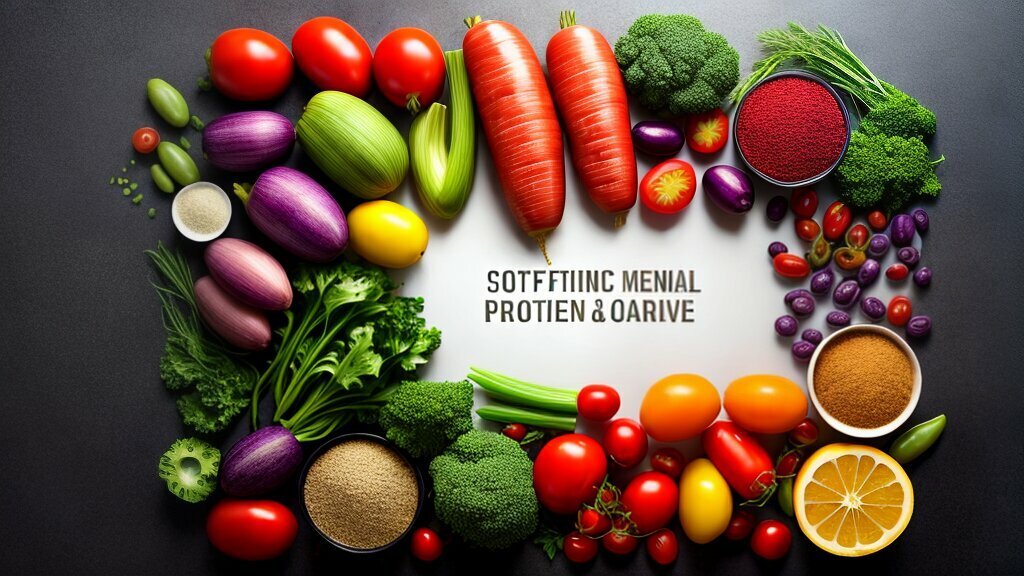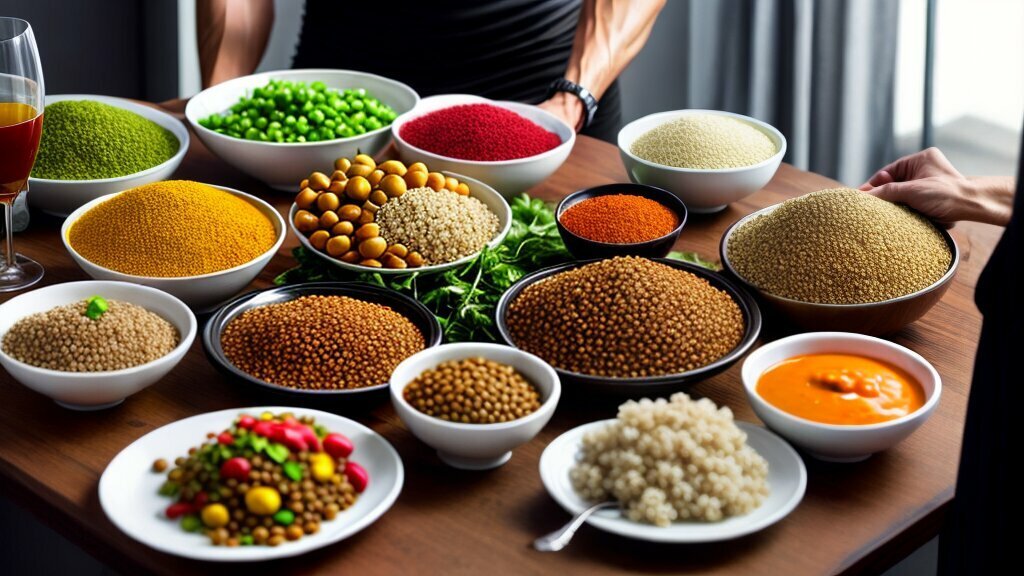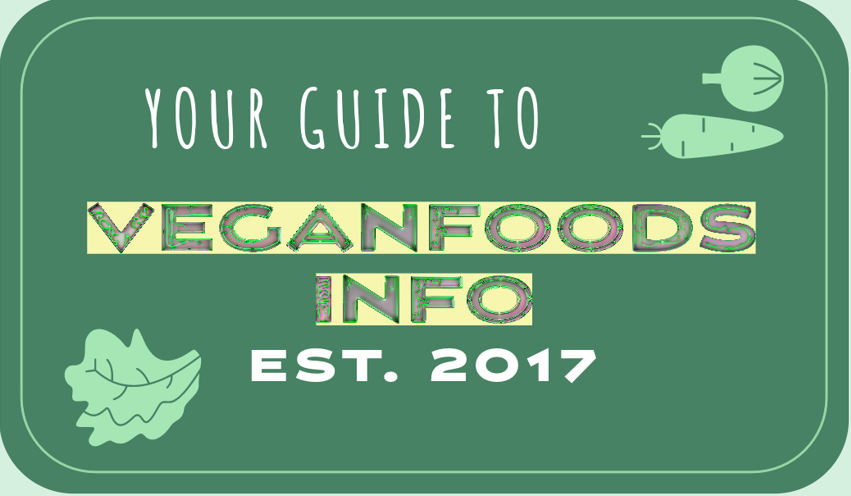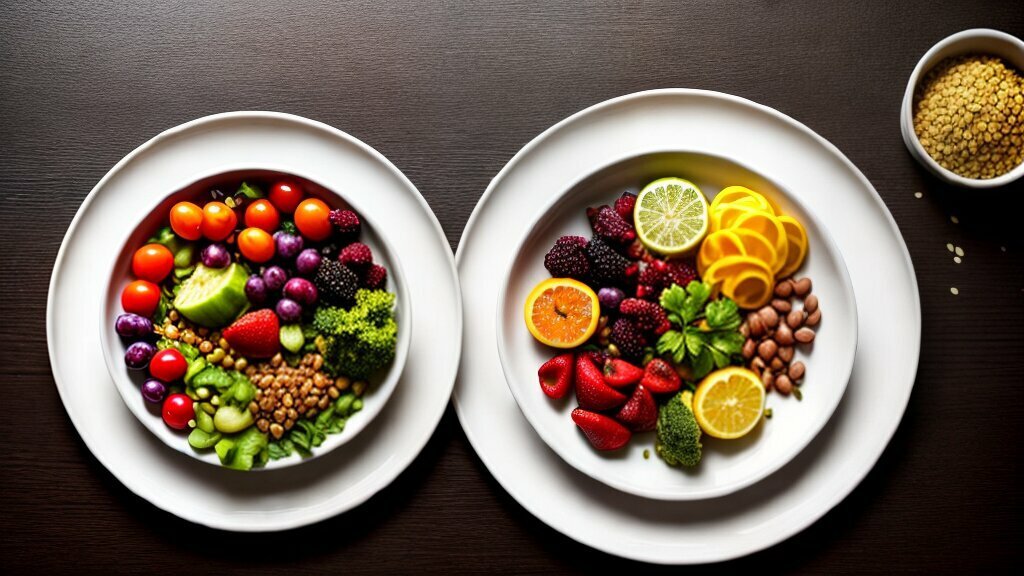Welcome to our guide to plant-based diets! If you’re wondering, “what is a vegetarian,” and are curious about the many benefits of this lifestyle, you’ve come to the right place. Being a vegetarian means consuming a diet that is primarily made up of fruits, vegetables, grains, and legumes, while excluding meat and fish. The reasons for adopting this lifestyle vary, but most vegetarians follow this dietary choice for personal health and environmental reasons.
As you read through this guide, you’ll discover more about the different types of vegetarians, the benefits of a vegetarian diet, and what foods you can eat and avoid. Additionally, we’ll discuss meeting protein needs as a vegetarian and compare vegetarianism to veganism and pescatarianism. By the end of this guide, you’ll have a better understanding of what it means to be a vegetarian and why this lifestyle choice might be right for you.
Key Takeaways:
- A vegetarian is someone who consumes a plant-based diet and excludes meat and fish.
- There are various types of vegetarians, including lacto-ovo vegetarians, lacto vegetarians, ovo vegetarians, and pescatarians.
- A vegetarian diet has many benefits, such as improving personal health, protecting the environment, and supporting animal welfare.
- Vegetarians can consume a variety of plant-based foods, but should avoid meat, fish, and poultry.
- Meeting protein needs as a vegetarian is possible through consuming legumes, nuts, seeds, and grains.
Exploring Different Types of Vegetarian Lifestyles
Vegetarianism is a diverse and varied lifestyle, with multiple kinds of diets that adhere to plant-based eating. Each type of vegetarian has specific dietary restrictions and allowances that range from no animal products to limited use of certain animal products.
Lacto-Ovo Vegetarians
Lacto-ovo vegetarians make up the largest population of vegetarians. They avoid meat, fish, and poultry, but still consume dairy products and eggs. This type of vegetarianism is the most flexible and versatile, as it allows for a wide range of food choices.
Lacto Vegetarians
Lacto vegetarians exclude meat, fish, poultry, and eggs but do consume dairy products. This type of vegetarianism is common in India and surrounding countries, where meat consumption is low and dairy products are a regular part of the diet.
Ovo Vegetarians
Ovo vegetarians avoid meat, fish, poultry, and dairy products but still consume eggs. This type of vegetarianism is less common than lacto-ovo vegetarianism but still provides a variety of food options.
Pescatarians
Pescatarians exclude meat and poultry but still consume fish and seafood. This type of vegetarianism is popular among those who want to reduce their meat intake but still have access to a variety of protein sources.
Semi-Vegetarians
Semi-vegetarians, also known as flexitarians, occasionally consume meat and poultry but primarily follow a plant-based diet. This type of vegetarianism is not as strict as the others, but still emphasizes the importance of consuming fruits, vegetables, and whole grains.
Understanding the differences between vegetarian lifestyles is crucial for those who wish to adopt a plant-based diet. Whether one chooses to exclude dairy or eggs, or include fish, there is a vegetarian lifestyle that can work for them.

The Benefits of a Vegetarian Diet
Adopting a vegetarian diet can have numerous benefits for both personal health and the environment. Here are some of the key reasons to consider this lifestyle choice:
- Better heart health: Vegetarianism may lower the risk of heart disease, as it typically involves a higher intake of fiber, antioxidants, and other nutrients that promote cardiovascular health.
- Reduced cancer risk: Plant-based diets may also reduce the risk of certain types of cancer, such as colon and breast cancer.
- Weight loss: Vegetarianism can be a helpful tool for weight management, as plant-based diets are often lower in calories and fat than meat-based diets.
- Environmental sustainability: Choosing a vegetarian diet may help reduce greenhouse gas emissions and decrease the demand for resources like water and land.
- Animal welfare: Many people adopt a vegetarian lifestyle for ethical reasons, as it avoids contributing to animal suffering in the food industry.
While vegetarianism and veganism share many similarities, there are some key differences to consider. For example, a vegan diet eliminates all animal products, while a vegetarian diet may still include dairy, eggs, and other animal-derived products. However, both lifestyles can offer significant health and environmental benefits.

What Can Vegetarians Eat and Avoid?
As a vegetarian, there are many delicious and nutritious foods you can enjoy without compromising your dietary choices. However, it’s important to understand what you should avoid in order to maintain your vegetarian lifestyle.
Firstly, it’s important to note that vegetarians do not consume meat, poultry, or seafood. This includes all types of meat such as beef, pork, lamb, and chicken, as well as any products derived from them, such as broth or gelatin.
While vegetarians avoid meat, many still consume dairy products such as milk, cheese, and yogurt. However, strict vegetarians, or vegans, do not consume any animal products, including dairy.
It’s also important to clarify that vegetarians do not consume fish or any other type of seafood, despite the common misconception that pescatarians follow a vegetarian diet.
So what can vegetarians eat? A wide variety of fruits, vegetables, legumes, grains, and nuts are available for vegetarians to enjoy. Plant-based protein options such as tofu, tempeh, and seitan can also be incorporated into meals. Additionally, many vegetarian-friendly products are available, including veggie burgers and faux meat products made from plant-based ingredients.
By understanding what to avoid and incorporating a variety of plant-based foods into your diet, you can enjoy a delicious and well-rounded vegetarian lifestyle.

Meeting Protein Needs as a Vegetarian
One common concern for those considering a vegetarian diet is whether they will be able to consume enough protein. However, many plant-based foods offer ample protein, making it easy to meet daily requirements.
For lacto-ovo vegetarians, eggs and dairy products are excellent sources of protein. A single egg contains around 6 grams of protein, while a cup of milk contains 8 grams and a cup of Greek yogurt contains 23 grams.
Vegetarians who avoid dairy and eggs can turn to other protein sources, such as legumes, nuts, and seeds. A cup of cooked lentils contains 18 grams of protein, while a quarter-cup of almonds contains around 7 grams. Additionally, soy products like tofu and tempeh are high in protein and can be used in a variety of dishes.
Veganism vs Vegetarianism vs Pescatarianism
While vegetarianism and veganism both eliminate meat from the diet, the two differ in that vegans also avoid all animal products such as dairy, eggs, and honey. Despite this, vegans can still consume adequate protein through sources such as tofu, quinoa, and lentils.
Pescatarians, on the other hand, include fish in their diet and therefore have access to a protein source that vegetarians and vegans do not. Additionally, fish provides essential omega-3 fatty acids that are not found in plant-based foods.
Ultimately, protein needs vary based on individual factors such as age, activity level, and body weight. However, with a well-planned vegetarian or vegan diet, it is entirely possible to consume adequate protein to maintain a healthy body.

Conclusion
By now, you should have a better understanding of what it means to be a vegetarian and the various aspects of a plant-based diet. Adopting a vegetarian lifestyle comes with numerous benefits, including personal health, environmental sustainability, and animal welfare.
There are several different types of vegetarians, each with their own specific dietary restrictions and allowances. Whether you choose to be a lacto-ovo vegetarian, lacto vegetarian, ovo vegetarian, or pescatarian, it’s important to ensure that you are meeting your protein needs through a balanced, plant-based diet.
As a vegetarian, you have a wide range of food options available to you, and there’s no need to sacrifice taste or variety. By exploring new recipes and incorporating a diverse range of fruits, vegetables, grains, and legumes into your diet, you can lead a healthy and fulfilling lifestyle.
Takeaway
Choosing to adopt a vegetarian lifestyle is a personal decision, and it’s important to do what works best for you. However, by considering the numerous benefits of a plant-based diet and exploring the different types of vegetarians, you may find that this lifestyle choice aligns with your personal values and goals.
FAQ
Q: What is a vegetarian?
A: A vegetarian is someone who follows a plant-based diet that excludes the consumption of meat, poultry, and seafood. They primarily rely on fruits, vegetables, grains, legumes, nuts, and seeds for their nutrition.
Q: What are the different types of vegetarian lifestyles?
A: There are several types of vegetarian lifestyles, including:
– Lacto-ovo vegetarians: They avoid meat, poultry, and seafood but consume dairy products and eggs.
– Lacto vegetarians: They avoid meat, poultry, seafood, and eggs but consume dairy products.
– Ovo vegetarians: They avoid meat, poultry, seafood, and dairy products but consume eggs.
– Pescatarians: They avoid meat and poultry but consume seafood, along with a plant-based diet.
Q: What are the benefits of a vegetarian diet?
A: Adopting a vegetarian diet offers numerous benefits, including:
– Improved personal health: Vegetarian diets are associated with lower risks of heart disease, high blood pressure, type 2 diabetes, and certain types of cancer.
– Environmental sustainability: Plant-based diets have a lower carbon footprint and contribute to reduced deforestation, water consumption, and greenhouse gas emissions.
– Animal welfare: Choosing a vegetarian lifestyle supports the ethical treatment of animals and reduces their exploitation for food.
– Comparison to veganism: While both vegetarianism and veganism offer benefits, vegetarianism allows for more flexibility in dietary choices and may be easier for some individuals to adopt and maintain.
Q: What foods can vegetarians eat and avoid?
A: Vegetarians can consume a wide variety of plant-based foods, including fruits, vegetables, whole grains, legumes, nuts, and seeds. However, they avoid meat, poultry, seafood, and in some cases, dairy products and eggs, depending on their specific vegetarian lifestyle.
Q: How can vegetarians meet their protein needs?
A: Vegetarians can obtain protein from various plant-based sources, such as legumes (beans, lentils, chickpeas), tofu, tempeh, seitan, nuts, seeds, and certain grains (quinoa, amaranth). It is possible to meet protein requirements through a well-balanced vegetarian diet.

